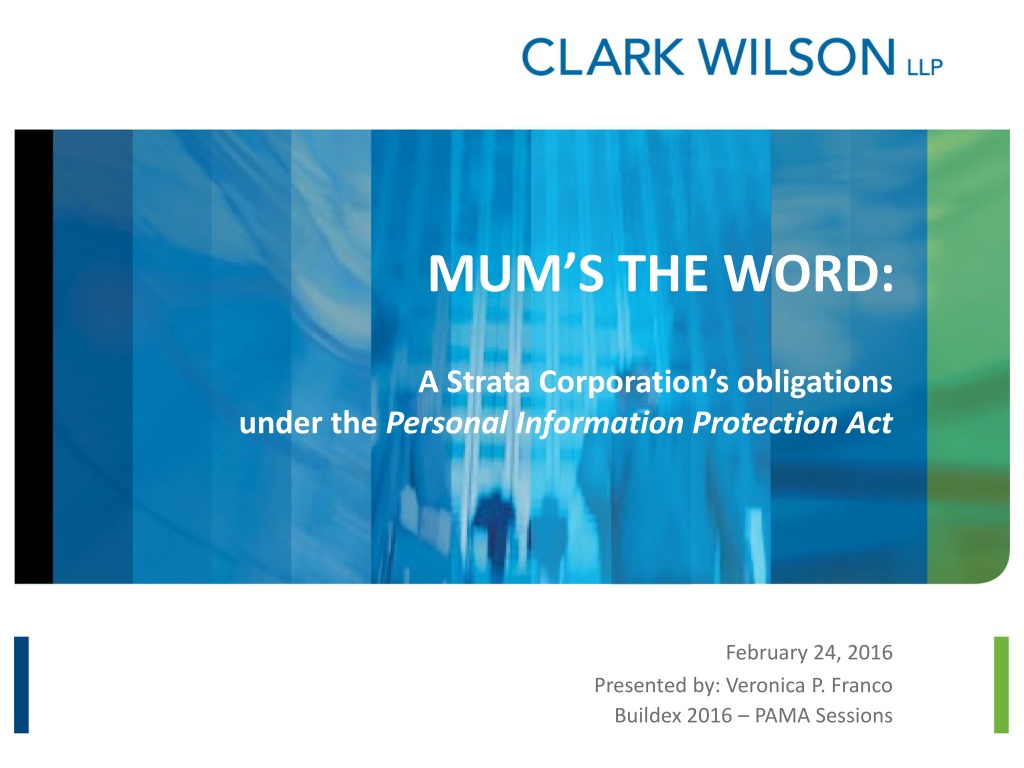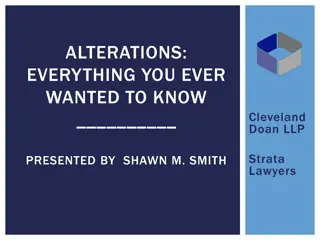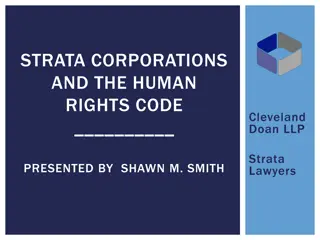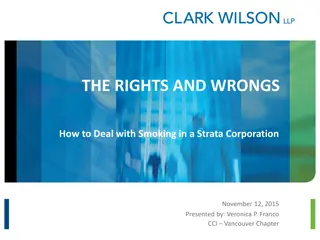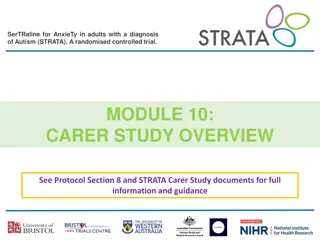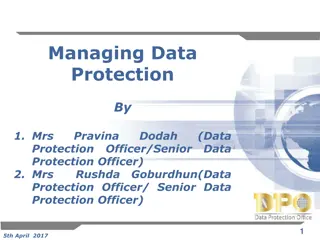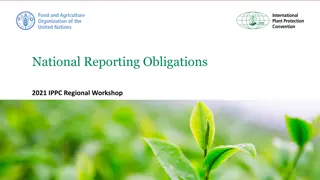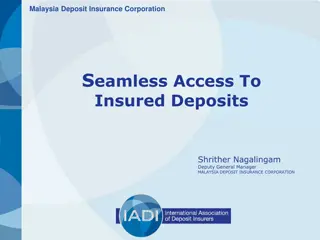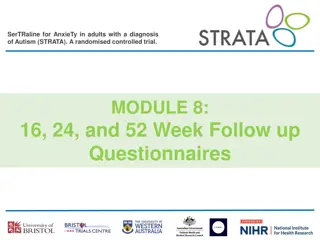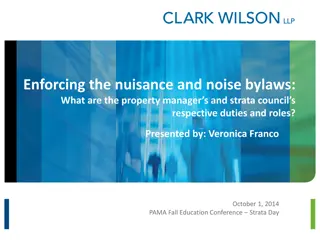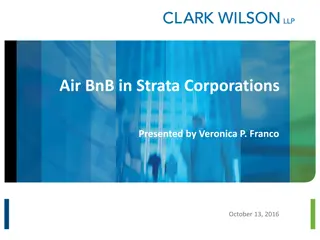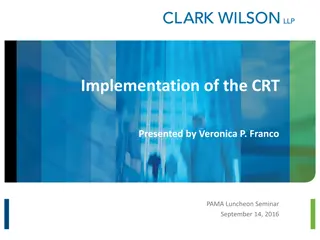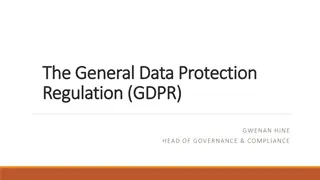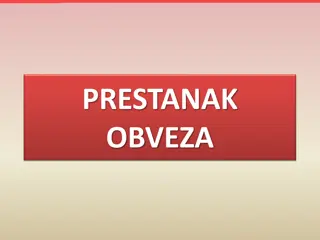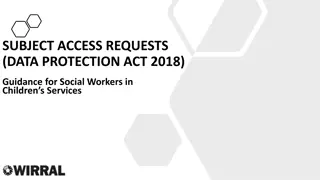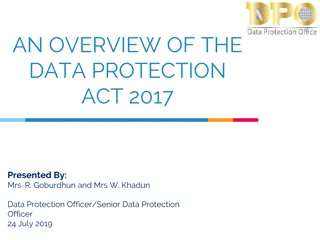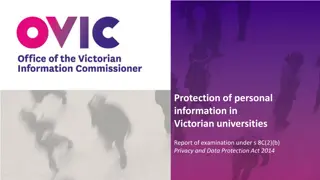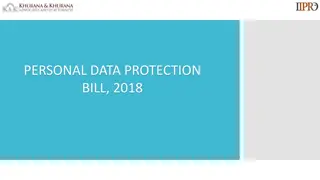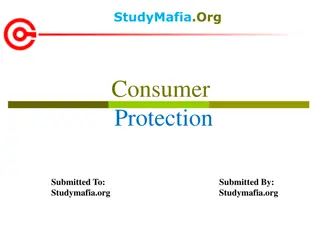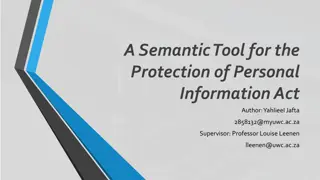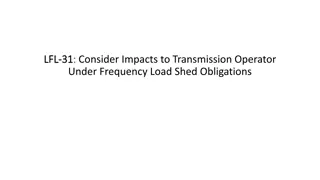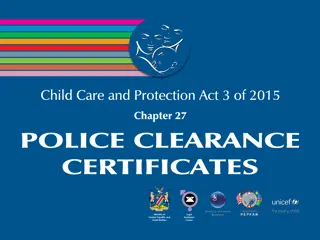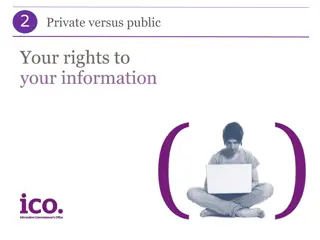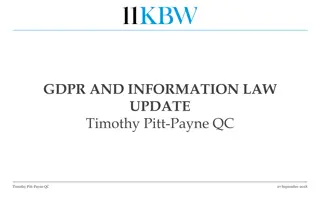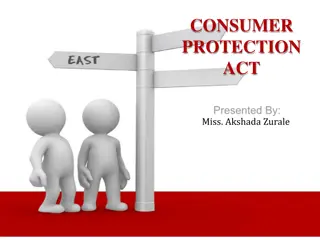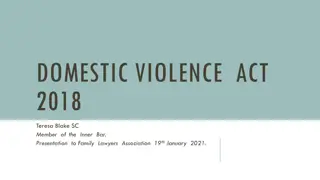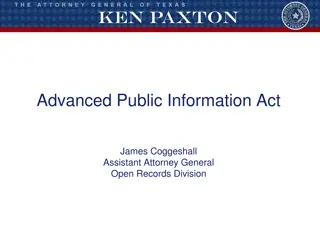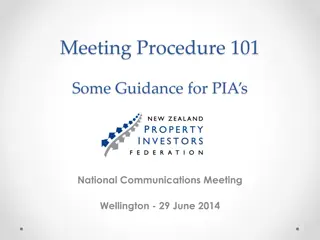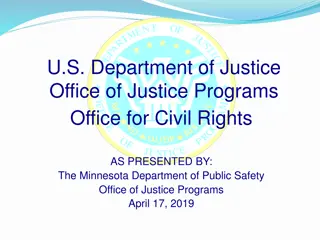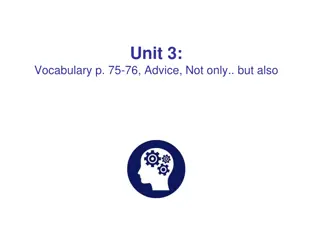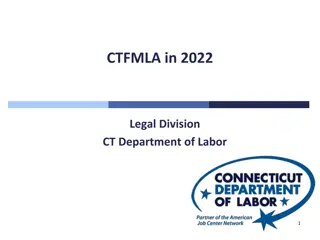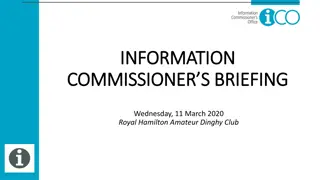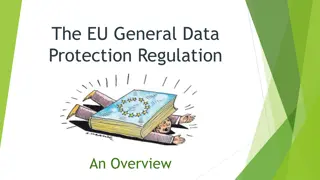Strata Corporation Obligations under Personal Information Protection Act
The presentation discusses the obligations of strata corporations under the Personal Information Protection Act (PIPA), focusing on privacy guidelines, objectives of PIPA, definition of personal information, and rights of owners and tenants regarding their personal information. It also outlines the responsibilities of strata corporations in designating a privacy officer, obtaining consent, handling complaints, and ensuring accuracy and security of personal information.
- Strata Corporation
- Personal Information Protection Act
- Privacy Guidelines
- Data Security
- Privacy Rights
Download Presentation

Please find below an Image/Link to download the presentation.
The content on the website is provided AS IS for your information and personal use only. It may not be sold, licensed, or shared on other websites without obtaining consent from the author. Download presentation by click this link. If you encounter any issues during the download, it is possible that the publisher has removed the file from their server.
E N D
Presentation Transcript
MUMS THE WORD: A Strata Corporation s obligations under the Personal Information Protection Act February 24, 2016 Presented by: Veronica P. Franco Buildex 2016 PAMA Sessions
Introduction In July 2009, Office of the Information and Privacy Commissioner ( OIPC ) released guidelines to assist with the disclosure obligations of a strata corporation and strata managers under the Personal Information Protection Act ( PIPA ). On June 22, 2015, the OIPC released an updated version of its Privacy Guidelines for Strata Corporations and Strata Agents - www.oipc.bc.ca/guidance- documents/1455 On the same date, the OIPC published PIPA and Strata Corporations: Frequently Asked Questions . 2
Understanding the Objectives of PIPA govern the collection, use and disclosure of personal information by organizations in a manner that recognizes both the right of individuals to protect their personal information and the need of organizations to collect, use or disclose personal information for purposes that a reasonable person would consider appropriate in the circumstances 3
What is personal information? Information about an identifiable information: Name, address and phone numbers, Banking or credit card information; Emergency contact information; Names of occupants in a strata lot; Debts owed to the strata corporation by an owner; Vehicle license plate numbers. 4
General Rights and Requirements Owners and tenants have rights over their personal information, including: Being told the purpose for its collection, use or disclosure; Expect that the purposes are reasonable and appropriate; Know who is responsible for protecting it; Expect appropriate protection measures over it; Expect accuracy and completeness of it; Request access to and correction of it; Having complaints addressed of how it is handled; 5
General Rights and Requirements (contd) Strata corporation s obligations: Designate a privacy officer to be accountable for PIPA compliance; Obtain consents before collecting, using or disclosing it Tell reasons for collection, use and disclosure, including to whom, and how it is being used; Use, disclose and retain it only for the same reasonable purpose; Ensure completeness and accuracy; Respond to complaints without delay; Have clear and readily available personal information policies; Destroy, erase or make anonymous what is no longer required. 6
Privacy Officers Role and Obligations Strata corporation s obligations: Ensure the strata corporation s privacy policy and procedures are being followed; Respond to requests by strata owners and tenants for access to their personal information; Reviewing personal information security safeguards, storage and retention policies and procedures on a periodic basis; Responding to requests for access to personal information under PIPA; Handling all complaints in relation to the collection, use and disclosure of personal information under PIPA. 7
Collection of Personal Information PIPA requires that a strata corporation must not collect personal information unless: The individual consents; PIPA authorizes the collection without consent; or PIPA deems the collection to be consented by the individual. Only collect the minimum amount of personal information that is reasonable for it to fulfill its obligations under SPA and other relevant legislation. 8
Types of Consent Express: individual actually consents in writing or orally for the purpose stated by the strata corporation eg. PAD agreement info; Implied: voluntary disclosure of personal information for a purpose of which the individual is aware eg. Providing a telephone number for council to contact owner for emergencies while out of town. This type of consent may require clarification over the scope of the purpose for collecting, using and disclosing. 9
Exemptions from Consent Section 12 of PIPA sets out the circumstances a strata corporation may collect personal information without any consent. No consent is required to collect personal information if: the collection is required or authorized by law; it is necessary to collect a debt of the strata corporation; it is reasonable to expect that the collection with the consent of the individual would compromise the availability or accuracy of the personal information and the collection is reasonable for an investigation or proceeding; the collection is clearly in the interests of the individual and consent cannot be obtained in a timely manner; It is available from a public source. 10
Use and Disclosure Personal information that has been collected with consent must only be used and disclosed for the original purpose it was collected. It can only be used for another purpose if new consent is obtained for the other purpose. Like collection, PIPA sets out exemptions for using and disclosing personal information without consent. They are the same exemptions as for collection. They are set out in sections 15 and 18 of PIPA. 11
Examples of Collection without Consent The collection is clearly in the interests of the individual and consent cannot be obtained in a timely manner: While owner is on vacation, there is a leak from that unit. The neighbour is a good friend and has the key to check on the unit. In that emergency, the strata corporation may be collecting personal information about how to contact the owner (overseas tel # or email address) to deal with the emergency. 12
Examples of Collection without Consent It is reasonable to expect that collection with the consent of the individual would compromise the availability or the accuracy of the personal information, and the collection is reasonable for an investigation or a proceeding. Bylaw infraction procedures under section 135 of the SPA are included in the definition of proceedings. To find out if an owner s child is living in an over 19 complex, the strata council may collect relevant information from neighbours without the consent of the owner. This collection is only permitted if obtaining consent would compromise the availability or accuracy of the information necessary to determine whether a bylaw has been contravened. 13
Examples of Collection without Consent The Personal Information is necessary to collect a debt of the strata corporation Generally, implied or express consent is obtained. However, the use or disclosure of personal information is not always with consent. For example, when you issue a demand letter for payment of arrears of strata fees and send a copy to them mortgagee. 14
Examples of Collection without Consent The Personal Information is available from a public source The address of an owner listed in BC Assessment Records; The strata lot numbers, unit entitlement and voting rights; Telephone number available in the phone book. 15
Collect, Use and Disclose Required by law Sections 35 & 36 Records to be kept and disclosed upon request Minutes of council and general meetings; List of council members; List of owners names, address of strata lot, address outside of the strata plan, if different, & parking stall number; List of tenants; List of names and addresses of mortgagees who are individuals and have filed a Request for Notification; Assignment s of voting or other rights by landlords to tenants; Books of account showing money received and spent and the reason for the receipt or expenditure 16
Collect, Use and Disclose without consent Sections 35 & 36 Records to be kept and disclosed upon request Books of account showing money received and spent and the reason for the receipt or expenditure Waivers and consents under sections 41, 44 or 45; Form B Information Certificates issued; Correspondent sent or received by the strata corporation and council; 17
Collect, Use and Disclose without consent Sections 115 and 116: Form F: Certificate of Payment; and Form G: Certificate of Lien. 18
Changes to PIPA Guidelines Complaint letters = correspondence sent or received by the strata corporation and council, which is required by law. Therefore, complaint letters do not require any consent under PIPA before they are collected, used or disclosed. Sections 35 and 36 requires a strata corporation to disclose to any owner, assigned tenant , or a person authorized in writing by the owner upon request. 19
Changes to PIPA Guidelines Complaint letters = correspondence sent or received by the strata corporation and council, which is required by law. Therefore, complaint letters do not require any consent under PIPA before they are collected, used or disclosed. Sections 35 and 36 requires a strata corporation to disclose to any owner, assigned tenant , or a person authorized in writing by the owner upon request. 20
Changes to PIPA Guidelines Complaint letters = correspondence sent or received by the strata corporation and council, which is required by law. Therefore, complaint letters do not require any consent under PIPA before they are collected, used or disclosed. Sections 35 and 36 requires a strata corporation to disclose to any owner, assigned tenant , or a person authorized in writing by the owner upon request. 21
Dealing with bylaw complaint letters Let owners know through minutes that they must be disclosed upon request; Verbal complaints or other ways to make complaints anonymously; Consider when it might be appropriate to withhold disclosure. 22
Bylaw complaint letters - Withholding Disclosure Section 23(1) of PIPA: requires disclosure of all personal information under the strata corporation s control, including the way the personal information is used and to whom the personal information has been disclosed. Section 23(2) of PIPA provides that disclosure is not required if the information was collected or disclosed without consent for the purposes of an investigation and the investigation and associated proceedings and appeals have not been completed. 23
Bylaw complaint letters - Withholding Disclosure A strata corporation can withhold a bylaw complaint letter: Until the section 135 proceedings are completed; If it is reasonable to expect that the disclosure with consent would compromise an investigation or proceeding and the disclosure is reasonable for purposes related to an investigation or proceeding. Is there a chance of retaliation or would it silence the complainant? 24
Other correspondence Hardship applications and bylaw exemption requests sent by email or letter = correspondence and must be disclosed. Consider standard bylaw 17(4), which provides that no observers should be present during portions of council meeting dealing with rental hardship exemptions and other matters that would interfere unreasonably with an individual s privacy 25
Other correspondence PIPA requires the strata corporation to keep any documents it has relied upon in making a decision for one year (i.e. financial documents in a hardship application) Would the disclosure of medical information in a bylaw exemption request be a Human Rights Code violation or an aggravating factor? 26
Other correspondence What is considered correspondence? Letters; emails; Memoranda and notes? Texts? Instant messaging? 27
Correspondence not captured under s. 35 Section 35 correspondence sent and received by the strata corporation and council What does that include? correspondence by an officer that is authorized by council to be sent on behalf of the council or by an officer who has been delegated by council the power to deal with the matter Internal discussions are not included PIPA, including requirement to redact applies! 28
Other documents Ballots; General Meeting sign in sheets; Notices posted or taken down from bulletin boards; Proxies. PIPA applies disclosure with consent only and redaction may be necessary. 29
Guidelines for Minute Taking and PIPA AGM/SGM/strata council names, strata lot numbers and/or unit numbers are okay whatever the practice, stick to it; Decisions made/result of all votes must be recorded; exact discussions need not and probably shouldn t be included; no commentary; names of guests. 30
Guidelines for Minute Taking In Camera Portions of a Council Meeting are part of the council meeting and should be minuted. In camera simply means observers are not allowed: Bylaw or rule hearings; Fine hearings; Discussions regarding legal action against an owner; Liability of owner for remedial work in relation to work order; Amount owing by owner for outstanding strata fees. 31
Surveillance and Keyfobs Overview: Surveillance should only be used after other less privacy-intrusive measures have failed to address the problem. Strata Corporation must be prepared to justify the use of surveillance based on verifiable, specific concerns about personal safety or to protect common property. 32
Surveillance and Keyfobs Monitor only public parts of the property required for security. Mandatory to create a privacy policy to deal with surveillance and/or key fobs. Obtain consent or pass bylaws authorizing installation and use. 33
The New Privacy Guidelines Video surveillance and key fob systems: these systems are to be used for very limited purposes. not to justify levying fines, nor should they be used to monitor a pool area or inside fitness rooms. live feed of cameras should not be made available through owners television cable system or to conduct routine review of the previous days footage. video footage or key fob data can be used in the event of damage to common property, but cannot be used to enforce minor bylaws. 34
Surveillance and Keyfobs Policy should address the following: The purposes for collecting and using the personal information; Who is authorized to access it; Location of surveillance cameras; Times the cameras will be operating; Length of time the video & keyfob records will be kept; How the strata corporation will respond to PIPA requests; 35
Preventing PIPA Breaches Create a privacy policy: know what you have consent to collect, use and disclose; If you have video surveillance or key fobs: create a policy for video footage and key fob activity use and disclosure; If you want to use personal information for a purpose not set out in the policies, get legal advice; Do not use video surveillance or key fob information for routine bylaw enforcement; Review the OIPC s Privacy Guidelines and FAQ s. If a request for very personal information is made, get legal advice first. 36
These materials are necessarily of a general nature and do not take into consideration any specific matter, client or fact pattern. Please direct inquiries or comments to: Veronica P. Franco 604.891.7714 THANK YOU
